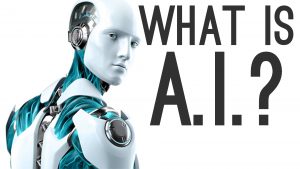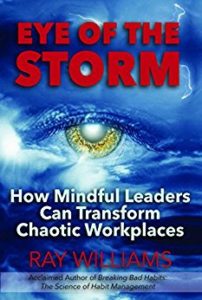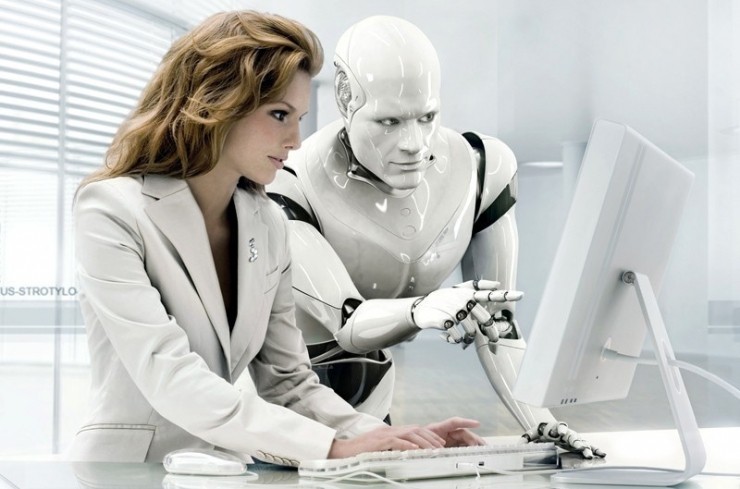What if your boss was a robot? One with advanced artificial intelligence and human-like physical features, capable of assessing your emotions? And would more robots mean removing the need for human managers? Another science fiction fantasy? Not so, claim some scientists. And what about the moral and ethical questions raised by the use of robots?

The Artificial Intelligence Revolution
Several mainstream and reputable publications have now devoted lead or cover stories to the issue of automation and use of robots, and the impact on the economy and how work is evolving.
In an article in The Atlantic magazine, Derek Thompson provides an in-depth analysis of the issue. He argues we are entering an era of technology that is vastly different than the past—one of “technological unemployment,” in which computers and robots will be able to virtually invent a large proportion of the population out of work “permanently.” He contends this is because human labor will no longer be the driver of economic growth. He also argues that the coming computer and robot revolution will make material goods cheaper, but that wealth that accrues will continue to be aggregated in the upper strata of society.

In the usually conservative journal, Foreign Affairs, much of the issue was devoted to the topic of robots. Daniela Rus, who is director of the Computer Science and Artificial Intelligence Laboratory at MIT describes the extensive use of robots currently and their expansion in the future. In the same issue, Erik Brynjolfsson and Andrew McAfee, also at MIT discuss the potential obsolescence of human labor and Martin Wolf an economics commentator for the Financial Times argues the impact and significance of today’s emerging technologies are vastly overestimated.
American producers of robots are already saying that investments in machines are more profitable than hiring people. Technology enables lower levels of human labor outlays, but the economy doesn’t allow people to survive.
An example of the use of computers in what was once regarded as a complex human job is stockbrokers. The functions of stockbrokers are increasingly being replaced by intelligent algorithms, which are better than humans in capturing changes in stock prices. Computer programs are also being employed to analyze large datasets (Big Data), and used by corporations for the purpose of planning and marketing. Any job that is done routinely and repetitively can be taken over by a computer program or robot. And think of journalists, most office work, even jobs in the medical profession, accounting and law.
“Robotization” is the final frontier of the world of work. If a machine can do something a human can do, it is only a matter of time before it does this cheaper and more efficiently. According to the Massachusetts Institute of Technology (MIT) economists Erik Brynjolfsson and Andrew McAfee, the authors of the book Race Against the Machine , the coming of the era of cheap production automation is a prelude to dramatic changes in the labor market.
Other studies confirm this. In a published paper titled: “The Future of Employment: How Susceptible are Jobs to Computerization” two researchers from Oxford University, C.B. Frey and M.A. Osborne, created a model, which calculates the probability of substituting a worker in a given sector. Frey and Osborne conclude machines may replace 47 % of active workers in the future.
The Pew Center for research conducted a study on the subject, concluding “The vast majority of respondents to the 2014 Future of the Internet canvassed anticipate that robotics and artificial intelligence will permeate wide segments of daily life by 2025, with huge implications for a range of industries such as health care, transport and logistics, customer service, and home maintenance. But even as they are largely consistent in their predictions for the evolution of technology itself, they are deeply divided on how advances in AI and robotics will impact the economic and employment picture over the next decade.”
Traditionally, increased productivity correlates with economic growth and job growth, since human labor has historically driven production. A robot workforce, however, can drive productivity and growth on its own, eliminating jobs in the process. That might mean the whole paradigm of exchanging labor for pay starts to break down. “If we persist in the view that the dividends from robots’ increased productivity should accrue to robot owners, we’ll definitely come to a future where there aren’t enough owners of robots to buy all the things that robots make,” Cory Doctorow wrote in a recent Boing Boing post.
Yuval Noah Harari should be an anonymous academic buried in an obscure university department somewhere toiling away on his somewhat dusty discipline – medieval military history. He’s a professor of history at the Hebrew University of Jerusalem and there is almost nothing in his background to suggest that he would write a book that has become one of the most talked about non-fiction bestsellers of the year – Sapiens. In an interview in The Guardian, ) he talked about the coming age of cyborgs.
He argues we’re on the cusp of perhaps the greatest change for the human race ever, saying, “The one thing that has remained constant in history was humans themselves. Homo sapiens, you and me, we are basically the same as people 10,000 years ago. The next revolution will change that.” The “next revolution”, as Harari sees it, the latest in a line that began with the cognitive revolution and takes in the agricultural revolution and the scientific revolution, is what is happening in the biotech field, in artificial intelligence.“When people talk about merging with computers to create cyborgs, it’s not some prophecy about the year 2200. It’s happening right now. More and more of our reality exists within computers or through them.”
But this is only the start of it. For the first time in history, “we will see real changes in humans themselves – in their biology, in their physical and cognitive abilities”. And while we have enough imagination to invent new technologies, we are unable to foresee their consequences he contends.
So with this as a background, let’s return to the question posed in the title of this article: “What If You Had a Robot For Your Boss?”
More than anything, the issue of emotions remains the most difficult to address with robotic technology. Yet, computers already have developed a capacity to deal with emotions such as, “stressed”, “fear”, “anger” and other emotion-oriented words, because they generally rely on self-monitoring, Many can even be progarmmed to handle self-motivation. For example, when a sensor in a car indicates a bad fuel mix problem, a car even today can warn its owner that it is feeling “sick,” and should go to the car doctor–the dealer’s service center.The next step would be a self-navigating car that asks its owner if it could drive to the car doctor itself, so that it can talk to the car doctor’s AI to let it know exactly what the problem is.
The other aspect of robotization is the Internet of Things. Increasingly, everything is being connected to the Internet, and the Internet is being imbedded into everything from merchandize to buildings. Eventually the use of this kind of AI will be seamless with robotics.
Are any jobs safe? Some experts believe that jobs that require judgment and interactions with other people might be saved. Examples would be in the healthcare, education and social net sectors. All of these require the human touch.
As Erik Brynjolfsson and Andrew McAfee describe in their book The Second Machine Age, “thinking machines”—from autonomous robots that can quickly learn new tasks on the manufacturing floor to software that can evaluate job applicants or recommend a corporate strategy—are coming to the workplace and may create enormous value for businesses and society. They raise some key questions though. Although technological limitaitons are disappearing, social, moral and ethical ones remain. How can you persuade your team to trust artificial intelligence? Or to accept a robot as a member—or even as a manager? If you replace that robot, will morale suffer? Will you be able to express your emotional concerns to your robot manager?
Yet, research has shown giving machines a voice, a body, or even a name can tap into this tendency and make people more comfortable working with them. For instance, we seem to collaborate with robots more effectively when they make “eye contact” with us and we think they’re cuter and more humanoid when they tilt their heads to one side.
Research from MIT’s Computer Science and Artificial Intelligence Lab (CSAIL), show how groups of two humans and one robot worked together in one of three conditions: manual (all tasks allocated by a human); fully autonomous (all tasks allocated by the robot); and semi-autonomous (one human allocates tasks to self, and a robot allocates tasks to other human). The fully autonomous condition proved to be not only the most effective for the task, but also the method preferred by human workers. The workers were more likely to say that the robots ‘better understood them” and “improved the efficiency of the team.”
A study from the Human-Computer Interaction Lab at the University of Manitoba, suggests that you’ll probably obey a robot boss nearly as predictably as you would a human. The researchers found humans willing to take orders from computers, but much less readily than from other humans. Participants were asked to perform a menial task (renaming computer files) for 80 minutes, and a computer named “Nao” was able to exert enough authority to keep 46% of participants on task for the full 80 minutes even as they voiced a desire to quit. Humans were almost twice as likely —86%—to obey another human, in this case an actor in a white lab coat. Still, researchers were struck that “even after trying to avoid the task or engaging in arguments with the robot, participants still (often reluctantly) obeyed its commands. These findings highlight that robots can indeed pressure people to do things they would rather not do.”
Robotic or computer software managers may seem far-fetched, and today few predict when the authority figure in the corner office is an automaton. But in recent years, a surprising array of managerial functions has been turned over to artificial intelligence. Computers are sorting resumes of job seekers for relevant experience and to estimate how long a potential employee is likely to stay. They are mapping email exchanges, phone calls and even impromptu hallway interactions to track workflow and recommend changes. Widely used software is analyzing customer data for algorithms, which in turn is changing when and where workers are deployed.
Wharton management professor Peter Cappelli director of Wharton’s Center for Human Resources argues robot bosses are no substitute for human bosses. “ It is possible for software to provide sophisticated information (i.e. ‘Here is how you are doing’). But management is still a much more complicated task of making adjustments to the work being performed in order to meet changing demands, diagnosing problems and offering solutions,” Cappelli argues.
Shawndra Hill, a Wharton professor of operations and information management argues automated functions and algorithm-driven decisions are becoming ingrained in the workplace. She says anything that can be coded and tied to the bottom line is an opportunity for model building.
In nearly all categories relating to HR from recruitment to performance management, companies participating in the CedarCrestone 2013-2014 HR Systems Survey said they were substantially increasing technology enablement of HR processes. (The survey represented 20 million employees, mostly in the U.S.)
Experts like Cappelli and other management gurus present another argument. One that taps into the trend toward workplace autonomy and independence of workers. Increasingly, jobs are knowledge related and employees are educated. And many of them want more autonomy over their job, particularly Gen Y employees. Cappelli says, “You don’t need a boss, you have to report info to our software system [instead]—they might actually like it.”
So a number of practical and ethical questions remain to be answered regarding the question of replacing managers with robots. The practical ones, including developing sophisticated enough algorithms to deal with a million different scenarios that involve human judgment are already being developed in labs around the world. The ethical question of constant monitoring of employees movements and actions by robots and software programs remains a thorny issue for policy makers. And finally, can robots be made to be so humanoid in features including dealing with emotions to generate trust in employees remains a substantial obstacle?
One thing is for sure. The workplace is changing and the nature of what a workplace looks like, and applications of technology to allow remote and mobile independent work may make the current use of managers obsolete. But will they be replaced by robots, or replaced by individual worker initiative?
Read my latest book: Eye of the Storm: How Mindful Leaders Can Transform Chaotic Workplaces, available in paperback and Kindle on Amazon and Barnes & Noble in the U.S., Canada, Europe and Australia



